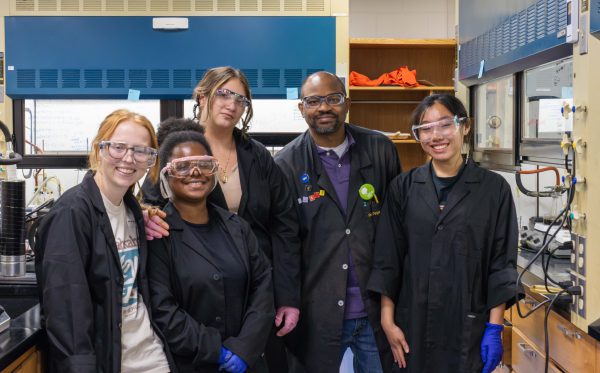For Dwight Williams, the Kurt D. Kaufman Associate Professor of Chemistry at Kalamazoo College, persistence has paid off. After nearly a decade of research and one unsuccessful grant application, Williams has been awarded a three-year grant from the National Institutes of Health (NIH) to support his work developing new molecules that could help protect brain cells from dying from neurodegenerative diseases.
The grant, worth nearly $385,000, is a milestone for both Williams and his students, who have played a central role in shaping the project since its inception.
“After an unsuccessful application in 2018, I went back to the basics and sought guidance and mentoring from my networks, which ultimately strengthened the resubmission,” Williams said. “Receiving this award is such an encouragement, not only for the research ahead, but also for the opportunities it generates for Kalamazoo College’s students.”
Tackling Neurodegeneration
Williams said that while neurodegenerative diseases like Alzheimer’s, Parkinson’s, Huntington’s and Glaucoma each begin in different ways, they have been found to share a common cellular process that significantly damages or kills brain cells. His lab focuses on ways to block or reduce this process, extending the health and function of brain cells.
Over the course of the grant, Williams and his students will aim to synthesize and test five families of compounds, each consisting of several unique molecules, for their neuroprotective potential. Results will be shared with the broader scientific community through peer-reviewed publications and conference presentations.
Expanding Opportunities for Students
The NIH funding represents more than just progress in the lab. It directly supports K students by providing stipends for two of them each summer for the next three years, ensuring that financial barriers don’t prevent their participation in research.
“Many of our students want to engage in scientific research, but limited funding has often been the biggest barrier,” Williams said. “This award helps bridge that gap by expanding access to meaningful research experiences.”
In addition to stipends, the grant will allow the lab to acquire new equipment and instrumentation, speeding up experiments and enabling access to data that previously wasn’t possible for the lab to collect. These upgrades, Williams said, will help his students grow as independent scientists while working on a project with real-world significance.
Williams defines success in part by the progress of his student researchers. His aim is to help them strengthen their scientific identity, deepen their research independence, and prepare for graduate school, professional careers and leadership roles.
“Being awarded this funding shows the scientific community the incredible talent and aptitude of the young scholars here at K,” Williams said. “The majority of the data used in this proposal was produced by our students. That is very impressive to me.”

Williams Thanks …
“I want to thank my many mentors, Dr. Yan Zhang and Dr. Jill Bettinger of Virginia Commonwealth University; Dr. Laura Furge; and Dr. Syliva Fitting of UNC-Chapel Hill, who have helped me bring this together. I am also deeply grateful to every young scholar who has contributed to this project over the years. Their dedication and creativity have been essential to moving the work forward. I am especially thankful to:
- Suma Alzouhayli ’17
- Myles Truss ’17
- Rachel Chang ’18
- Natalie Hershenson ’18
- Christina Keramidas ’18
- MinSoo Kim ’18
- McKinzie Thiede ’19
- Madeline Harding ’22
- Skyler Rogers ’23
- My-Anh Phan ’23
- Rhys Koellmann ’24
- Jenna Beach ’24
- Cassy Bennett ’25
- Katya Koublitsky ’25
Thank you for sharing your skills and talents with the Williams Lab and for contributing uniquely to this project since its inception. This award is a reflection of your hard work.”
Since Williams arrived at K in 2015, he has mentored dozens of students in the lab, recalling each by name and recognizing the role they played in advancing the work. “Their dedication and creativity have been essential to moving the work forward,” he said. “This award is a reflection of their hard work.”
Persistence and Gratitude
Williams also acknowledged the challenges of securing federal research support at a time when funding is increasingly limited. The lab’s first NIH application in 2018 was administratively withdrawn and rejected. The resubmitted proposal, sent in February 2024, required patience while awaiting the decision.
“Knowing that the federal funding landscape is changing only reinforces the necessity of persistence, perseverance and patience,” Williams said. “Things are going to be very different moving forward, but I am continually encouraged by our students because I know they can face tough challenges, execute excellent science and solve big problems by working together—all while having fun and building community along the way.”
Williams added that his faith has guided him throughout the process.
“I must first thank my Lord and Savior, Jesus the Christ,” he said. “Without Him, this opportunity would not have been possible.”
He also expressed gratitude to mentors at Virginia Commonwealth University, the University of North Carolina-Chapel Hill and K, as well as to colleagues such as former Director of Faculty Grants Jessica Fowle ’00.
Looking Ahead
For Williams, the NIH grant represents both an achievement and a launching point. It will allow him to pursue ambitious research goals, expand opportunities for student scientists, and share discoveries that might one day contribute to new treatment strategies for people around the world.
“The work supported by this grant has the potential to benefit people far beyond our campus,” Williams said. “And the students engaged in this work will carry forward skills that will influence communities and fields for years to come.”
